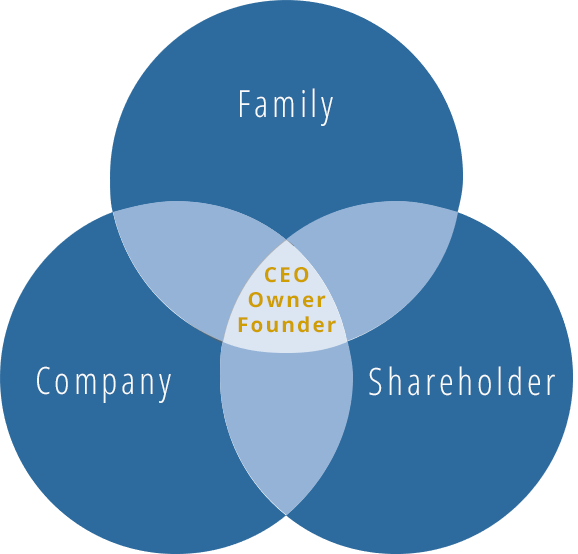Why it pays off to prepare the generation change at an early stage
Successfully designing generational change in family businesses
Family businesses are often described as the backbone of the German economy. They enjoy a special level of trust among the population and are generally perceived as reliable employers characterized by sustainable and value-oriented corporate management, cross-generational thinking, and a great commitment to their region and society. They are regarded as the “human face of the economy”. In times of crisis, family businesses repeatedly prove to be particularly resilient and adaptable.
Compared to other types of organizations, however, family businesses face particular challenges. Especially times of transition, such as the process of business succession, can create a great deal of vulnerability in the company. Therefore, particularly careful and sensitive preparation is required to manage the existing paradoxes and to successfully shape the generational change.
Family businesses - a special type of organization
Family businesses are different from other types of organizations. After all, there is more than “just” a business to manage – it is also necessary to take into account the sometimes paradoxical interests, needs, and goals of the family and the shareholder group at the same time.
The interplay of these three systems, which are constantly growing, makes transition processes such as the already challenging process of generational change even more complex. However, when skillfully balanced, the interaction of these three systems represents an enormous source of strength for the company.

The generation change puts established routines to the test
In the process of generational change, numerous profound shifts take place at the same time:
Not only do roles in the company change; established communication and decision-making routines are also put to the test. New structures are formed, and management structures and management cultures, some of which have existed for generations, are called into question. A generational change can turn the entire company upside down. The many aspects of change can cause unrest and uncertainty both in the company and in the family.
A sensitive approach is necessary to absorb the sometimes intense feelings – time is a valuable factor here.
Why early preparation for the generation change is sensible
The topic of generational change is present in every entrepreneurial family in one way or another. However, serious discussion of it is often postponed or it is simply not possible to get beyond a certain point.
Even with great determination on the part of all those involved to carry out the generation change, the process of business succession can stall if there is a lack of clarity about the “how”. Different expectations, unclear responsibilities and, not least, personal needs within the entrepreneurial family and the circle of shareholders can cause a standstill or even regression in the process. As a rule, such developments do not go unnoticed by the workforce, customers, and business partners.
An automotive trading group in Bavaria was also faced with these challenges. Read our practical example to find out how the generation change finally succeeded.
Addressing the process of corporate succession at an early stage provides a valuable time budget to carefully prepare the generational change and thus enable a smooth transition.
The generational change in a family business is a highly complex process with many opportunities and risks. The way in which it is planned and implemented has a significant influence on the outcome.
– Robert A. Sedlák
CEO | Head of Consulting Field Organization and Human Resources

Our consulting services for family businesses

Download background information
Learn more about systemic organizational consulting for family businesses. Download free background information on our consulting services for family businesses.
Clarity on day X
If succession planning is started at an early stage, the day of the handover can be prepared in advance with sufficient time. In this way, the successor can immediately focus on the operational business when taking over management responsibility.
Early preparation makes it possible to work on all these aspects without pressure, so that by the time the handover takes place, it is clear to everyone how the company will position itself in the coming years and what structures are required for this.
Preparing for generational change at an early stage has numerous advantages:
A change at the top of the family business creates uncertainty in many places within the company, the family, and the circle of shareholders. Established routines and structures, roles and leadership cultures are questioned – by the successor management, but also by numerous executives who want to balance their position and potential in the new management constellation.
If the process of corporate succession is tackled at an early stage, the company’s management, together with the family and the group of shareholders, can use sufficient time to analyze how the company needs to position itself and strategically align itself in order to maintain its future viability in the long term. If the company management, the family, and the shareholders agree on the path to be taken in the future, everyone involved will have a sense of security and a common goal. Communication with the workforce can also be clear and unambiguous, thus counteracting in advance any uncertainties associated with the generation change.
One of the most difficult and consequential tasks of corporate management is to put the right people in the right place in the company. Sufficient time is a valuable factor here.
Particularly those in charge are under special pressure in the process of company succession in family businesses. A decision made solely on the basis of family logic can have fatal consequences for the company. However, if the family logic is disregarded and thought of solely from a business logic, this can have an impact on the family life.
The necessary resources are not always in the family – or in the company – at the right time. In these cases, it becomes necessary to recruit external people, even if individual members of the family or the company have a different opinion.
In any case, the decisions made can cause tensions and grievances. A structured process for identifying and preparing the appropriate people for the envisioned roles and the use of objective decision-making tools such as assessments can help prevent this.
The qualification of potential company successors or future members of the shareholder group should also be addressed at an early stage. Although those responsible are now becoming increasingly aware of the importance of this process, too often qualification is limited to business knowledge and neglects knowledge of the corporate culture and the values of the company – aspects that are of great importance for making wise decisions for the company.
Unresolved conflicts, misunderstandings, and differing ideas about the strategic positioning of the company among family members, shareholders, and managers can paralyze family businesses and render them incapable of making decisions. In order to resolve such conflicts, it is necessary to disclose the existing, sometimes paradoxical interests, values, objectives and also the feelings of those involved and to bridge existing differences of opinion. Following this, courses of action are developed together.
Once the different points of view have been made explicit, all parties are given a clear view of the possible solutions. In this way, decisions can be made and supported jointly, and the company is once again able to act.
Further information
Contact options
If you would like to learn more about us and our consulting approach, we look forward to a personal conversation with you! Simply make an appointment with us.

Online
Make a non-binding inquiry and let us know your expectations in this way
 Frédéric SedlákSenior Consultant | HR Management
Frédéric SedlákSenior Consultant | HR ManagementWe are always at your service+49 4102 69 93 22
Ask for free informationf.sedlak@spconsulting.de









